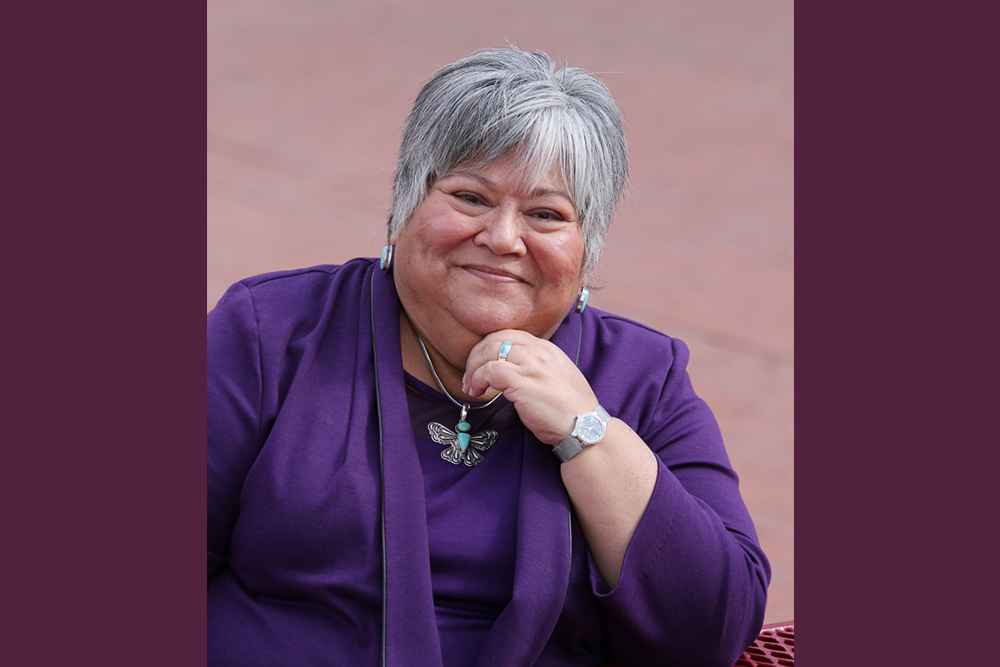IRIS DE LEÓN-HARTSHORN MA ’05 has served Mennonite Central Committee (1996-2007) and Mennonite Church USA (2007-present) in various leadership roles. Previously the church’s director of transformative peacemaking, the Portland, Oregon, resident is now its associate executive director for operations, a new position that encapsulates the roles of chief of staff and key advisor to the executive director. She has been a strong advocate for racial and gender justice in the church and its related institutions.
This Q and A was first published in the 2018 Peacebuilder magazine, a publication of the Center for Justice and Peacebuilding. See more articles here or view the digital issue.
On Aug. 18, Glen Guyton was installed as the executive director of Mennonite Church USA. He is the first African-American and non-ethnic Mennonite to hold the position. Can you share some of your feelings surrounding his appointment?
I am both excited and cautious. Glen is an exceptional human being who loves God and the church. He believes the church can be better in living out the Gospel and he wants to work with others, including the next generation, to help shape the church’s future. At the same time, I am cautious because racism is alive and well. People often can’t seem to see how it operates in the church. My hope and prayer is that Glen will have enough support to see him through some of the racism he will encounter.
What motivates you to continue your work with Mennonite and Anabaptist-rooted institutions in search of change and transformation?
I was brought up Catholic and dabbled with the Presbyterians and Baptists, but found my home in the Anabaptist tradition. No church tradition is perfect because it’s filled with human beings. My experiences as a Latina ingrained a deep concern for justice, both in itself and as a way toward right relationships with God, humanity and creation. It’s been an honor to work with many in the Mennonite church with that same conviction and vision of transformation. Relationships within the church and outside provide motivation to continue God’s reconciling work.
What strategies have you utilized to connect and integrate communities of people of color in church institutions?
Sometimes the work of transformation takes trial and error. Early on, the goal was educating about systemic racism and how it operated in our church institutions – a difficult lesson for many in the dominant culture who have the luxury to think in relational terms and be unaware of the systemic nature of racism and how it privileges white people. Real change has to happen at the systemic level, but there is an essential interpersonal piece rooted in being allies or agents of change in partnership with people of color (POC).
In recent years, Mennonite Church USA and related institutions have sponsored a yearly gathering called “Hope for the Future” – a wonderful, safe place for POC in leadership positions, including staff and board members, to forge relationships and determine what we need to work on within the church and what we need to publicly articulate. This space has been especially important in the current atmosphere that has given permission for people to openly act out their racism. We have tried to provide both respite and encouragement so that we POC can continue to be in the church.
You once wrote, “Reconciliation can’t happen when people leave; it happens when we choose to stick it out together.” These words resonate beyond the church context into other realms of peacebuilding. Can you talk about what “sticking it out together” means?
Tom Yoder Neufeld [professor emeritus, Conrad Grebel University College] has talked about equating the Holy Spirit with the wind, which blows things together that don’t seem to go together. Tom says that as the church, we come together not because we necessarily belong together, but God has brought us together and now we need to figure out how we live together.
Finding ways to stick together can be painful but as followers of Christ, that is what we are called to do. That is the work of God’s reconciling mission for the world. It’s hard to work things out if one party leaves the conversation. When we have theological or ideological differences in how we see the church or our organization, we need to find ways to talk with and trust each other. If we can do that, we can find a way forward.
Since graduating from CJP, is there one particular learning that has been of practical use?
I learned so much at CJP. Most useful was the exercise of putting my experiences within a theoretical framework and then the permission to consider other options. The quote I use often from Jayne Docherty, “I am not married to one theory, but I date around.”
Most impactful, though, was the encouragement and push to see myself as a capable academic. In high school, I was told Mexicans don’t go to college – a message that has plagued me most of my life. Halfway through the first meeting of a theory class, I walked out and cried in the hallway telling myself there was no way I could pass. [Academic Programs Director] Jayne Docherty came outside, listened, then pushed back and challenged me. I owe Jayne much gratitude in helping that message to stop playing in my head. She was a mentor and is still a friend.

Iris, you are a powerful asset to our denomination and our world.
Thank you for hanging in there with insight and love!
I am encouraged by the work of Iris and Glen Guyton and look forward to having them lead us into a more racially open perspective.